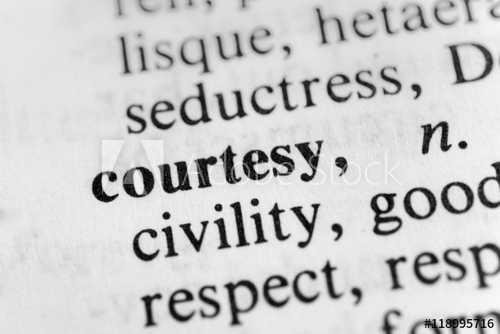CIVILITY
Topic: CIVILITY
Civility is about more than just politeness, although politeness is a necessary first step. It is about disagreeing without disrespect, seeking common ground as a starting point for dialogue about differences. It is the act of showing regard for others by being polite, like the civility you showed in speaking kindly to someone who has hurt your feelings civility should begins with us.
Civility.....
 image credit
image credit
So important, yet neglected by so many
Perhaps the simplest definition of civility is formal politeness in behaviour and speech Civility entails....
showing regard to others by being polite
being friendly and nice to everyone
disagreeing respectfully
it requires social intelligence or social IQ which impacts our ability to empathize with people and realize all people are human
The difference between tolerating someone and respecting them focuses on the fact that toleration does not imply respect but respect requires understanding of another person's perspective.
People can still work together even if they do not always absolutely agree with each other's point of view
When civility functions properly, we have persons doing the right things, at the right time, for the common good.
In the course of our daily interactions with others, we can easily identify individuals with civil outlooks. But what factors contribute to building civility in individuals? Why is that lady so polite......while the other is always rude?
The Community/environment in which an individual grows up goes a long way in shaping his character.
The choices we make. We all have the power to choose whether to be friendly or unfriendly. To be rude or polite. To smile or frown. To be cooperative or uncooperative. The freedom of choice is very powerful and we must use it wisely.
What we are today is the product of the choices we made yesterday. What we will be in the future is a product of the choices we make now.Our nature. It appears some people are naturally civil. When we look around us, we will always notice that child who is always nice to every other child, no matter how far they go in provoking him to anger.
The outcomes of civility
 image source
image source
Better and more meaningful friendships and relationships
A peaceful and stable society
Better working environments which increased productivity and consequently, increased profits
Growth and development (an offshoot of 3 above)
The individual's good manners/speech➡ Better relationships ➡ Peace ➡ Increased productivity ➡ Growth/Development.
It begins with YOU. Incivility is the opposite of civility. Rude. Uncouth. Disrespectful. Tactless. Abusive. Wicked.
👆👆👆👆
are all synonyms of incivility.
Causes of incivility
- Stress
- Frustration
- Inferiority complex
- Improper upbringing
- Past poor choices
Etc
Outcomes of incivility
The dangers of not acting with respect or decency could make nations/governments fall apart.
Strife
Wars
Terrorism
Not achieving any of our life goals
Loss of opportunities. Etc
No individual is an island. We need others to succeed in life. We need each other to develop and move our nations forward. We need each other to make our nations great again. Without civility, no meaningful progress can be made. Unfortunately, as the world is becoming more connected in social interactions, it is increasingly obvious to us all that incivility has become an issue on the global stage.
In fact, it is at the root of all global crisis today.
When we fail to accept others the way they are, when we expect others to be exactly like we are, when we fail to recognize that others have a right to be different, and when we CHOOSE to disrespect and mistreat them simply because of these differences, there is bound to be crisis
How do we maintain civility despite our differences?
The very first step is to recognize that others can not be exactly like us.
Then, make a conscious decision to respectfully relate with that person in order to realize common goals.
Practice active listening. A civil discussion is the free and respectful exchange of diverse ideas.
Give others the opportunity to state their opinions, without interruptions.
As you listen, consider these possibilities:
a. That you may be wrong
b. That you may not know
c. There may be some good in their criticism/ideas
- There are times we need to walk away. Or even run away. 😊. We must learn to recognize such times.
There is always a best place and time for everything.
Choose your battles wisely.
Change the subject when necessary.
Note: A little rebellion, now and then, might be a good thing.
But always pick the right time to rebel.
- Be an upstander. The opposite of an upstander is a bystander.
An upstander is someone who recognizes something is wrong and then takes steps to put it right. An upstander holds individuals accountable for their actions and actively promotes an environment where all feel safe and supported. Maintain your poise. Be assertive.
By expressing yourself with determination and politeness, you may not stop the perpetrators of bad behaviour, but the visible support you have shown can have more support than you realize.
- Always take notice when others are civil. And appreciate them. Be grateful. The best act of civility is leading by example.
CLOSING CHARGE
_Every single day, we all have the opportunity to make our world better.
Ending incivility is every person's responsibility. Determine to be civil, whatever the circumstances. Educate others on civility and encourage them to practice same in their daily lives. Civility begins with me(you), wherever I(you) am(are)._
!cheetah ban
Account has been previously caught for plagiarism. Refused to stop.
!cheetah unban
Plagiarism